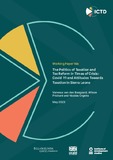| dc.contributor.author | van den Boogaard, Vanessa | |
| dc.contributor.author | Prichard, Wilson | |
| dc.contributor.author | Orgeira, Nicolas | |
| dc.coverage.spatial | Sierra Leone | en |
| dc.date.accessioned | 2023-05-25T13:03:20Z | |
| dc.date.available | 2023-05-25T13:03:20Z | |
| dc.date.issued | 2023-05 | |
| dc.identifier.citation | van den Boogaard, V.; Prichard, W. and Orgeira, N. (2023) 'The Politics of Taxation and Tax Reform in Times of Crisis: Covid-19 and Attitudes Towards Taxation in Sierra Leone', ICTD Working Paper 166, Brighton: Institute of Development Studies, DOI: 10.19088/ICTD.2023.026 | en |
| dc.identifier.uri | https://opendocs.ids.ac.uk/opendocs/handle/20.500.12413/17999 | |
| dc.description.abstract | The Covid-19 pandemic has had significant fiscal implications around the world. A key question facing governments is whether and how the pandemic has shaped taxpayer attitudes and what that means for the prospects for tax reform and new revenue raising in the wake of the pandemic. We aim to understand the impacts of the Covid-19 pandemic on attitudes toward taxation and, in turn, to unpack what the crisis reveals about the dynamics and politics of taxation more broadly. We do so in the context of Sierra Leone with novel survey data, collected before the pandemic, shortly after the pandemic’s onset, and for almost a year afterwards. Four key findings emerge. First, immediately after the onset of the crisis we see increased support for taxation in Freetown, despite escalating economic challenges. Second, however, we also see taxpayers express increasingly conditional
attitudes toward taxation; that is, at the same time that they show greater general support for taxation, they become more likely to believe that one could refuse to pay taxes if government fails to deliver services in return. Third, while we lack baseline data from before the pandemic on support for progressive taxation, we find rising and sustained support for progressive taxation over the course of the pandemic. Finally, although we see an initial increase in willingness to pay more for taxes for services immediately after the onset of the pandemic, we find evidence of that support eroding over time, potentially reflecting a combination of
continued economic hardship, declining feelings of social solidarity, and some disappointment with government taxation. These findings have potentially significant implications for understanding both immediate responses to the pandemic, and the broader
politics of taxation and tax reform. | en |
| dc.language.iso | en | en |
| dc.publisher | Institute of Development Studies | en |
| dc.rights.uri | http://creativecommons.org/licenses/by/4.0/ | en |
| dc.subject | Finance | en |
| dc.subject | Health | en |
| dc.subject | Politics and Power | en |
| dc.title | The Politics of Taxation and Tax Reform in Times of Crisis: Covid-19 and Attitudes Towards Taxation in Sierra Leone | en |
| dc.type | Series paper (non-IDS) | en |
| dc.rights.holder | © Institute of Development Studies 2023 | en |
| dc.identifier.doi | 10.19088/ICTD.2023.026 | |
| rioxxterms.version | NA | en |
| rioxxterms.versionofrecord | 10.19088/ICTD.2023.026 | en |


